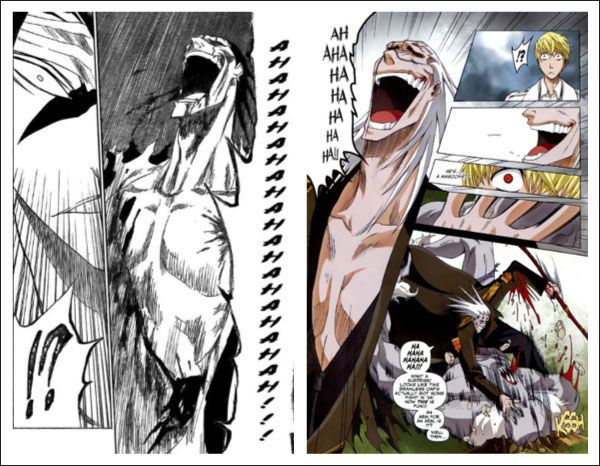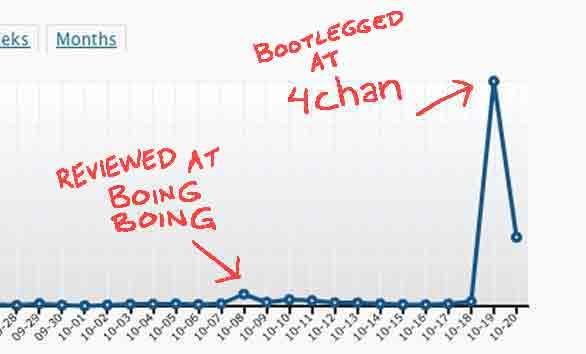If this was the year that publishers started taking legitimate digital comics seriously, it was also the year they started taking bootleg digital comics seriously. A group of American publishers banded together to take down HTMLComics.com, while American and Japanese publishers banded together to target bootleg manga scan sites. Six months later, HTMLComics.com is still down (and likely to stay that way, as the authorities have confiscated their servers), while the manga sites are back in business—in part, perhaps, because many are hosted overseas and thus out of the reach of American and Japanese authorities.
January
Kicking off a year in which piracy and creators' rights took center stage, Colleen Doran reveals that former clients have released some of work to the Kindle and Google Books without her consent, and despite the fact that they have no right to do so.
February-March
Matthew Meylikhov of Multiversity Comics takes a look at two comics that may have been killed by piracy, Phonogram and SWORD, and meditates on how this could happen.
When readers noticed a suspicious similarity between the art in Nick Simmons's Incarnate and Tite Kubo's Bleach, that was a case of plagiarism, not piracy, but it got people talking about the relationship between the two issues, especially when some folks noticed that Simmons was copying from volumes that haven't been published in the U.S. yet. In the wake of that controversy, Melinda Beasi confessed her own sordid past as a reader of scanlations.
April
Self-styled vigilantes try to shut down bootleg manga sites by complaining to their hosts and advertisers that they are hosting child pornography. The effort is ultimately unsuccessful but does force the sites to purge some of their adult manga, which probably cut into traffic a bit.
May
The pirate site HTMLComics.com is shut down when the FBI serves a warrant on owner Gregory Hart and confiscates his servers; the feds later filed a motion to confiscate his domain names as well. The move was prompted by a complaint by a consortium of comics publishers that included DC, Marvel, Dark Horse Comics, Bongo Comics, and Archie Comics, among others. Hart, who has a checkered history, claimed that his operation, which posted scans of comics in a browser for people to read, was perfectly legal because he did not allow downloads, and he likened it to a public library.
Meanwhile, the bootleg manga site Onemanga.com made Google's list of the 1,000 most visited websites.
June
A group of American and Japanese manga publishers threatens legal action against scanlation and bootleg manga sites such as Onemanga.com and MangaFox. A few days later, the site MangaHelpers announced that it would no longer carry illegal manga scans. While this is still true, Manga Helpers is currently carrying links to scans on other sites.
Digital Manga Publishing proposes a legal version of scanlation, in which publishers would allow fans to translate manga and post it online, and everyone would get a cut of the profits if the books sold.
MangaFox, the second most popular bootleg manga site, pulls its scans off the web. Blogger Kimberly Saunders points out that the scan sites may say they are taking down the scans, but they are still there if you know how to look. A quick check this morning revealed that bootleg manga, including Bleach and One Piece, is back on the front page of MangaFox.
July
The mighty Onemanga.com announces that it is taking down all manga scans from its website. They do so at the beginning of August, but as of this morning Onemanga.com, while loading incredibly slowly, is hosting the latest chapter of Naruto along with a host of other copyrighted manga.
August
Mark Waid and Sergio Aragones have sharp words about limitations on copyright versus the need for creators to make money, sparking a round of discussion on intellectual property rights.
September
Marvel hits Google with a round of takedown notices for sites that are hosting illegal scans of their comics, causing at least one site, Comic Invasion, to shut down altogether.
October
In one of the man-bites-dog stories of the year, sales of Steve Lieber and Jeff Parker's Underground spike after the entire comic was posted on 4Chan. Rather than send the 4Chan folks a takedown notice, Lieber joined the discussion on the site and suggested people consider paying for the book if they enjoy it that much. CBR Executive Producer Jonah Weiland discussed the matter in depth with Lieber a few days later.
November
Colleen Doran paints a bleak picture of piracy from the creator's point of view:
The minute this book is available, someone will take one copy and within 24 hours, that book will be available for free to anyone around the world who wants to read it. 3,000 hours of my life down the rabbit hole, with the frightening possibility that without a solid return on this investment, there will be no more major investments in future work.
Bloggers Johanna Draper Carlson (Comics Worth Reading) and Tim Geigner (Techdirt) push back, arguing that Doran isn't doing a good job of engaging her audience and giving them reasons to visit her site (or at least, doesn't get it).
The founders of the torrent-tracker site The Pirate Bay head to prison after an appeals court upholds their conviction for "assisting in making copyright content available."
December
At the Content Protection Summit in LA, a Warner Brothers exec shares some of what the company has learned about online piracy from tracking digital downloads of movies: Pirates and pirate site users do pay for some of their media, people use download tracker sites as a way to find new movies to watch, and many users of such sites are outside the U.S.
Someone figures out how to put bootleg manga on the Kindle, bypassing the Amazon store by providing download files that people can add to their Kindle manually.


